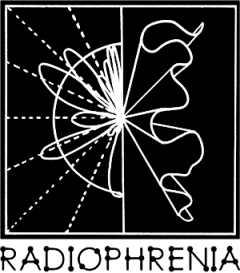Twilight of the Rock Gods

Its invidious for us to pick out Radiophrenia highlights because everything we broadcast is unique and deserving of attention. The time constraints involved in running a radio station force us to pick only a few selections to feature on our blog.
At 7pm tonight and repeated on Sunday at 2pm we’re delighted to present ‘Twilight of the Rock Gods’ by Luke Fowler and Richard McMaster. Luke is an artist and filmmaker and musician. His work explores the limits and conventions of biographical and documentary filmmaking, his filmic montages create portraits of intriguing, counter cultural figures, including Scottish psychiatrist R. D. Laing and English composer Cornelius Cardew. Richard will be familiar from his many projects in the Glasgow music scene such as Golden Teacher and General Ludd.
The piece focuses on the London Rock Music scene of the late1970/early 80’s and is accompanied by biographical reflections from a young East-Ender who has worked in the industry all his life and now finds himself unemployed . The source material originates from two different reel to reel collections, which had been sold or discarded. The first is a collection of demo tapes dating from 1974-78 produced by a London major label presumably to tout new releases to radio DJ’s. The music contained within the tapes highlights the spectrum of rock music being produced during the period; ranging from soft to prog rock, eventually giving way to disco and more electronic influences. This material is radically re-shaped by means of editing, looping and then feeding the loops through vintage hardware effects boxes. Fowler and McMaster wanted to use effects that were common in the studios at that time but were often used very conservatively by producers. In their methodology the effects are manipulated and ‘played’ as instruments in their own right.
The second archive of tapes were from a research Lab found within a major London University. Drawing mostly from one interview tape- the narrative that unfolds are biographical reflections of a young East-End professional, who started out as a music writer and then in various other roles from A&R to management liaison. Over the course of the interview he demystifies the often glamourised image the music industry. His comments frame and create associative meanings with the accompanying treated rock tapes.
At one point in the interview our narrator draws our attention to his stammer -alluding to the raison d’être for the interview. In fact the tape was selected from a larger collection of interviews with people who suffer from speech defects. During the course of the collage we also hear fragments of other research material cut in; including a woman reading elocution exercises and early speech synthesis experiments.


 Thank you to
Thank you to 